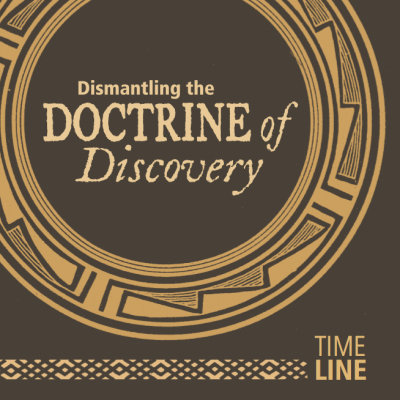Doctrine of Discovery Fact Sheet (.pdf)
In late August, a round table of over 20 Mennonites from the US and Canada met in San Francisco to explore ways for MC USA to pursue change regarding the Doctrine of Discovery. The doctrine justifies the way in which colonial and post-colonial powers claimed the lands of sovereign indigenous nations. This doctrine continues to influence United States Indian Law and has been cited as recently as 2005 in the decision, City of Sherrill V. Oneida Indian Nation of N.Y.
Luke Gascho, Creation Care Council chair, was part of the discussion. “Many European Mennonites benefited from the doctrine’s application across North America. It is important to recognize how the lands we call our own have this heritage,” reflects Gascho.
Part of the round table process was simply acknowledging this history and learning how to respond differently to indigenous people and our present situation. The Doctrine of Discovery, a 15th century concept introduced by leaders in the Catholic Church in the context of Christendom, granted Christian explorers the right to claim lands they “discovered” for the Christian monarchs of Western Europe during the Age of Discovery. Any land that was not inhabited by Christians was available to be “discovered,” claimed, and exploited. The current inhabitants of the land were subjected to forced conversions, enslavement or death.
The Round Table also spent time coming to terms with the ways scripture has been used to support injustice and stealing land from others. The discussion addressed ways this work could be introduced at upcoming assemblies.
The horrific consequences of the doctrine continue to affect human communities as well as ecological systems. Gascho concluded, “We must recognize that so much international work is still based on the concepts of this doctrine: extraction of minerals, deforestation, all of these industrial activities tend to follow this same principle.”
